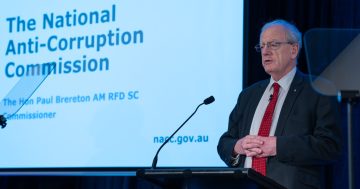
By dumping an investigation into public servants referred over Robodebt, the National Anti-Corruption Commission has been disappointing. Photo: File.
For all of the hullabaloo over the need for an anti-corruption watchdog at a national level, and for all of the self-congratulatory backslapping that accompanied its establishment, the National Anti-Corruption Commission has now demonstrated its worth and it has been found to be severely wanting.
The NACC’s decision to not even begin a corruption investigation into those public servants referred to it by the Royal Commission into the Robodebt Scheme is astounding.
And it is a slap in the face to the victims of the illegal scheme that was so eagerly pushed on them by an echelon of ruthless and uncaring government officials.
Robodebt was as disgraceful as it was tragic.
The royal commission was incredibly credible. It was thorough and dogged. Tough but fair.
In comparison, the National Anti-Corruption Commission stands weak – a toothless tiger afraid to do the job Australians want and need.
The NACC has stumbled at its first hurdle.
It shouldn’t bother pretending to take any future corruption referrals seriously.
Royal commissioner Catherine Holmes’ integrity and professionalism shone through her investigation.
She and her team were determined to get to the bottom of what went down and who was responsible.
The royal commission achieved that.
The nation was expecting something similar from the NACC.
But it got this instead:
“There is not value in duplicating work that has been or is being done by others, in this case with the investigatory powers of the Royal Commission, and the remedial powers of the APSC [Australian Public Service Commission].
“Beyond considering whether the conduct in question amounted to corrupt conduct within the meaning of the Act and, if satisfied, making such a finding, the Commission cannot grant a remedy or impose a sanction (as the APSC can).
“Nor could it make any recommendation that could not have been made by the Robodebt Royal Commission.
“An investigation by the Commission would not provide any individual remedy or redress for the recipients of government payments or their families who suffered due to the Robodebt Scheme.
“The Commission has therefore decided not to commence a corruption investigation as it would not add value in the public interest.”
Its statement then wanders off into meaningless bureaucratic speak – “lessons of great importance for enhancing integrity in the Commonwealth public sector and the accountability of public officials” can be learned from the royal commission’s outcomes, it states.
No kidding.
It goes on: “The Commission will continue through its investigation, inquiry, and corruption prevention and education functions, to address the integrity issues raised in the final report, particularly in relation to ethical decision making, to ensure that those lessons are learnt, and to hold public officials to account.”
What does that even mean?
It means that despite a determined royal commission uncovering despicable official behaviour, and despite providing names in the sealed section of its report of those the royal commissioner believed should be investigated – the NACC has dropped the ball.
Commissioner Holmes delayed handing down her findings to allow time for the NACC to get up and running.
That’s how important she thought the anti-corruption commission’s role should be in reaching a resolution to this blight on our recent history.
Yet the six publicly unnamed individuals commissioner Holmes referred to the NACC will not be held to account by it.
Five of those people were also on the list of names the royal commission referred to the APSC.
The NACC seems happy for the APSC to do any further heavy lifting.
No-one should expect to see any impressive outcomes there either.
But we all did have the right to expect that a new National Anti-Corruption Commission would live up to its name and at least try to determine for itself – and for the nation – whether these individuals in question were involved in corrupt behaviour while employed as highly paid public officials.
Original Article published by Chris Johnson on Riotact.







